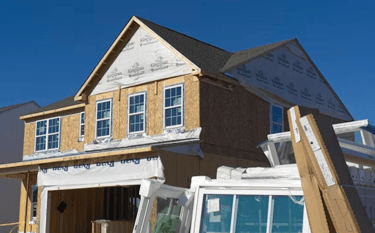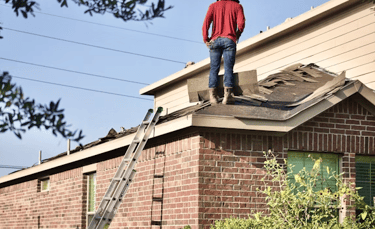Fact or Fiction: Storm Chasers in 2025
ROOFING


How The Roofing Industry Has Evolved and What You Need To Watch For
After a storm hits, roofing contractors seem to pop up out of nowhere. Often times showing up with a knock your door before the pavement has dried of the rain. For years, the term “storm chaser” has carried a negative connotation. But in 2025, is that label still valid? Or has the industry finally moved forward?
Let’s unpack what’s changed, what hasn’t, and how to tell the difference between a trusted professional and someone who’s just chasing a check.
But First, What Is A Storm Chaser?
Traditionally, storm chasers are out-of-town contractors who follow severe weather events from city to city, looking to cash in on insurance claims and high-volume repair work. They knock doors in affected neighborhoods, promising fast fixes and even “free roofs.” Unfortunately, many leave homeowners with poor workmanship, no warranty support, and no way to reach them once they skip town. The term, "storm chaser," has cast a dark cloud on the roofing industry as a whole, leaving the remaining reputable contractors seemingly guilty by association.
What Has Changed In 2025?
The roofing industry has undergone major shifts over the past decade. Thanks to new regulations, digital transparency, and homeowner hesitancy, today’s environment makes it harder for bad actors to operate under the radar. But that doesn’t mean they’ve disappeared entirely.
Here's How To Ensure You Stay Protected:
Local verification tools like Verified, Google Business Profiles, and Better Business Bureau listings make it easier to spot unregistered or fly-by-night companies.
Insurance claim protocols are stricter. Many carriers now require documented inspections, photo evidence, and licensed contractors for claim approval and release of withheld depreciation.
State-level licensing and permitting laws are being more heavily enforced in many regions.
Online reviews and word-of-mouth now play a much larger role in contractor selection, giving good companies the edge—if you take the time to research.
Warning Signs: Is This Contractor Legit?
Even in 2025, storm-chasing contractors often rely on urgency and pressure tactics to win jobs. Here are a few signs you might be dealing with someone who’s not in it for the long haul:
They pressure you to sign a contract on the spot: There should be no need to sign on until after they've guided you through the claim process and money is going to change hands.
They can’t provide local references or a verifiable address.
They say they’re “working in the area” but have no digital footprint (or only just created one).
They don’t pull permits or try to convince you it’s not necessary.
These are all red flags. Trustworthy contractors should have no problem providing proof of insurance, licenses, recent work in your area, and clearly defined terms in writing. For further credibility, check for the Verified stamp of approval to ensure all of these criteria and more, have been fully vetted.
Final Thoughts
The roofing industry has come a long way, but that doesn't mean you should let your guard down completely. Storm chasers still exist, but today, you have more control than ever. By slowing down, asking questions, and doing a little homework, you can separate the pros from the pretenders and get your roof fixed the right way.
And if you're not sure where to start, Verified can help connect you with a vetted local contractor who will treat your home like their own.
In Summary
Ask for documentation. License, insurance, and a written scope of work should be non-negotiables.
Check their online presence. Look for consistent branding, recent reviews, and completed local projects.
Verify their business address and contact info.
Ask for references.
Planning Your Next Project
Before making any final decisions, keep these 4 guidelines in mind:
Get Local Estimates: Costs and returns vary widely by region. Understanding your market is key.
Verify Permits and Codes: Especially for structural changes, utility upgrades, and to ensure code compliance.
Focus on Quality: Cutting corners on large projects can backfire, both in function and resale value.
Think Long Term: Choose upgrades that improve your lifestyle today and maintain appeal for tomorrow’s buyers.
Still not sure where to get started? That's what we're here for. Check Verified to find a contractor you can trust today!
Keep Reading Related Articles:






